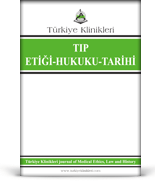The term moral distress, one of the problems encountered most frequently by nurses, describes the situations that arise from some constraints when a nurse feels that the correct action to take is different from what he or she is tasked with doing. This study aims at determining the situations that lead to moral distress and factors that affect them. This cross-sectional descriptive study was conducted through face-to-face interviews at two public hospitals and a university hospital e in the Aydın between January and March 2018. The research data were collected by using Personal Information Form and Moral Distress Scale for Nurses. Four hundred forty eight nurses working in the hospitals participated in this study. The total mean score obtained from the Moral Distress Scale was 36.74+14.32, and the highest mean score obtained from the sub-scales was taken from the time subdimension and the lowest score average from the possibilities sub-dimension. When the Moral Distress Scale mean scores are analyzed according to the demographic characteristics of the nurses; a statistical significance was found in the sub-dimensions in terms of age and hospital (p<0.05). In this study, the mean of moral distress of the nurses was found to be moderate. The age of the nurses and the institution where they work have a significant impact on their moral distress. It was concluded that nurses experienced the highest level of distress in the moral distress sub-dimensions in the time sub-dimension.
Keywords: Ethic; moral distress; nursing; perception; experience
Hemşirelerin günümüzde sık karşılaştığı sorunların başında gelen ahlaki sıkıntı kavramı, birtakım engellenmeler neticesinde doğru eylemlerin bilinmesine karşın yerine getirilemediği durumları ifade etmektedir. Bu çalışma, hemşirelerin ahlaki sıkıntı yaşama durumlarını ve etkileyen etmenleri belirlemeyi amaçlamaktadır. Kesitsel tanımlayıcı nitelikteki bu araştırma, Ocak-Mart 2018 tarihleri arasında yüz yüze görüşme yöntemi kullanılarak, Aydın ilinde bulunan iki devlet hastanesi ve bir üniversite hastanesinde yürütülmüştür. Araştırma verileri; Kişisel Bilgi Formu ve Hemşirelikte Ahlaki Sıkıntı Ölçeği kullanılarak toplanmıştır. Bu çalışmaya, hastanede çalışan 448 hemşire katılmıştır. Ahlaki Sıkıntı Ölçeğinden elde edilen toplam puan ortalaması 36,74+14,32 olup, alt ölçeklere bakıldığında alınan en yüksek puan ortalaması zaman alt boyutundan, en düşük puan ortalaması ise olanaklar alt boyutundan alınmıştır. Hemşirelerin demografik özelliklerine göre Ahlaki Sıkıntı Ölçeği puan ortalamaları incelendiğinde, yaş ve çalışılan hastane açısından alt boyutlarda istatistiksel anlamlılık saptanmıştır (p<0,05). Bu çalışmada, hemşirelerin ahlaki sıkıntı puan ortalaması orta düzeyde bulunmuştur. Hemşirelerin yaşları ve çalıştıkları kurum, ahlaki sıkıntı yaşama durumlarını önemli derecede etkilemektedir. Hemşirelerin ahlaki sıkıntı alt boyutlarında, zaman alt boyutunda en yüksek düzeyde sıkıntı yaşadıkları sonucuna ulaşılmıştır.
Anahtar Kelimeler: Etik; ahlaki sıkıntı; etik; hemşirelik; algı; deneyim
- Kayar Z, Erdem R. Hemşirelerde ahlaki sıkıntının işe adanma davranışı üzerine etkisi. [The effects of moral distress on work engagement behavi̇or in nurses]. Mehmet Akif Ersoy Üniversitesi Sos Bilim Enstitüsü Dergisi. 2017;9(22):77-103. [Crossref]
- Soleimani MA, Sharif SP, Yaghoobzadeh A, Sheikhi MR, Panarello B, Win MTM. Spiritual well-being and moral distress among Iranian nurses. Nurs Ethics. 2019;26(4):1101-13. [Crossref] [PubMed]
- American Association of Colleges of Nursing. Moral Distress. AACN. Published 2008. Accessed June 23, 2018. [Link]
- Oh Y, Gastmans C. Moral distress experienced by nurses: a quantitative literature review. Nurs Ethics. 2015;22(1):15-31. [Crossref] [PubMed]
- Dyo M, Kalowes P, Devries J. Moral distress and intention to leave: a comparison of adult and paediatric nurses by hospital setting. Intensive Crit Care Nurs. 2016;36:42-8. [Crossref] [PubMed]
- Hamaideh SH. Moral distress and its correlates among mental health nurses in Jordan. Int J Ment Health Nurs. 2014;23(1):33-41. [Crossref] [PubMed]
- Maluwa VM, Andre J, Ndebele P, Chilemba E. Moral distress in nursing practice in Malawi. Nurs Ethics. 2012;19(2):196-207. [Crossref] [PubMed]
- Shoorideh FA, Ashktorab T, Yaghmaei F, Alavi Majd H. Relationship between ICU nurses' moral distress with burnout and anticipated turnover. Nurs Ethics. 2015;22(1):64-76. [Crossref] [PubMed]
- Elpern EH, Covert B, Kleinpell R. Moral distress of staff nurses in a medical intensive care unit. Am J Crit Care. 2005;14(6):523-30. [Crossref] [PubMed]
- Silén M, Svantesson M, Kjellström S, Sidenvall B, Christensson L. Moral distress and ethical climate in a Swedish nursing context: perceptions and instrument usability. J Clin Nurs. 2011;20(23-24):3483-93. [Crossref] [PubMed]
- Hamric AB, Borchers CT, Epstein EG. Development and testing of an instrument to measure moral distress in healthcare professionals. AJOB Prim Res. 2012;3(2):1-9. [Crossref]
- Gutierrez KM. Critical care nurses' perceptions of and responses to moral distress. Dimens Crit Care Nurs. 2005;24(5):229-41. [Crossref] [PubMed]
- Karagozoglu S, Yildirim G, Ozden D, Çınar Z. Moral distress in Turkish intensive care nurses. Nurs Ethics. 2017;24(2):209-24. [Crossref] [PubMed]
- Eizenberg MM, Desivilya HS, Hirschfeld MJ. Moral distress questionnaire for clinical nurses: instrument development. J Adv Nurs. 2009;65(4):885-92. [Crossref] [PubMed]
- Yucel SC, Ergin E, Orgun F, Gokçen M, Eser I. Validity and reliability study of the Moral Distress Questionnaire in Turkish for nurses. Rev Lat Am Enfermagem. 2020;28:e3319. [Crossref] [PubMed] [PMC]
- Abbaszadeh A, Borhani F, Sharif F, Toghrai FA. The relationship between nurse's moral distress and end of life decision making in ICU. Med Ethics J. 2013;7(22):117-33. [Link]
- Schaefer R, Zoboli ELCP, Vieira M. Moral distress in nurses: a description of the risks for professionals. Texto Context - Enferm. 2018;27(4):1-10. [Crossref]
- Lusignani M, Giannì ML, Re LG, Buffon ML. Moral distress among nurses in medical, surgical and intensive-care units. J Nurs Manag. 2017;25(6):477-85. [Crossref] [PubMed]
- Sarkoohijabalbarezi Z, Ghodousi A, Davaridolatabadi E. The relationship between professional autonomy and moral distress among nurses working in children's units and pediatric intensive care wards. Int J Nurs Sci. 2017; 31;4(2):117-21. [Crossref] [PubMed] [PMC]
- DeCola PR, Riggins P. Nurses in the workplace: expectations and needs. Int Nurs Rev. 2010;57(3):335-42. [Crossref] [PubMed]
- Pijl Zieber EM, Awosoga O, Spenceley S, Hagen B, Hall B, Lapins J. Caring in the wake of the rising tide: moral distress in residential nursing care of people living with dementia. Dementia (London). 2018;17(3):315-36. [Crossref] [PubMed]
- Epstein EG, Hamric AB. Moral distress, moral residue, and the crescendo effect. J Clin Ethics. 2009;20(4):330-42. [PubMed]
- O'Connell CB. Gender and the experience of moral distress in critical care nurses. Nurs Ethics. 2015;22(1):32-42. [Crossref] [PubMed]







.: Process List